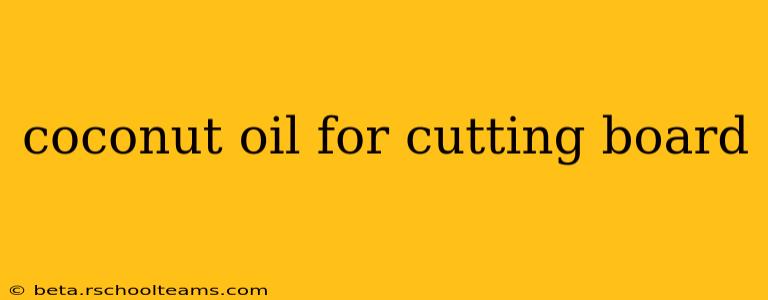Coconut oil has gained popularity as a natural and effective wood conditioner, and many homeowners wonder about its suitability for cutting boards. This comprehensive guide explores the benefits, drawbacks, and best practices for using coconut oil on your cutting board. We'll also address some frequently asked questions surrounding this topic.
Is Coconut Oil Good for Cutting Boards?
The answer is a nuanced yes, but with important caveats. Coconut oil can effectively moisturize wood, preventing dryness and cracking. Its antimicrobial properties are also a plus, offering some protection against bacterial growth. However, it's crucial to understand that coconut oil isn't a one-size-fits-all solution and isn't suitable for all cutting boards. The type of wood and your usage habits play a significant role.
What are the Benefits of Using Coconut Oil on a Cutting Board?
- Conditioning: Coconut oil penetrates the wood, replenishing lost moisture and preventing it from drying out, cracking, or warping. This keeps your cutting board in better shape for longer.
- Antimicrobial Properties: While not a replacement for proper sanitation, coconut oil possesses some natural antimicrobial properties that can help inhibit the growth of certain bacteria and fungi.
- Food-Safe: Refined coconut oil is generally considered food-safe, making it a relatively safe option for use on surfaces that come into contact with food. (Always ensure you're using food-grade coconut oil).
- Natural & Odorless (refined): Refined coconut oil is odorless, unlike unrefined coconut oil, making it a better choice for cutting boards. The scent of unrefined coconut oil can transfer to food.
What are the Drawbacks of Using Coconut Oil on a Cutting Board?
- Can Become Rancid: Coconut oil, even refined, can eventually become rancid if exposed to air and light for extended periods. This can lead to an unpleasant odor and potentially affect the taste of food prepared on the board.
- Not Suitable for All Woods: Some woods are more porous than others and absorb oil differently. Very porous woods might absorb too much oil, leading to a greasy feel. Hardwoods are generally better suited.
- Not a Sanitizing Agent: Coconut oil is not a replacement for proper cleaning and sanitizing. Always wash your cutting board thoroughly with soap and water after each use, and sanitize it regularly.
- Can Become Sticky: If you use too much coconut oil, the surface might become sticky, which isn't ideal for food preparation.
What Types of Cutting Boards are Suitable for Coconut Oil Treatment?
Hardwood cutting boards, such as those made from maple, cherry, or walnut, generally respond well to coconut oil treatments. These woods are less porous and less likely to absorb excessive amounts of oil. Avoid using coconut oil on softwoods or cutting boards with composite materials, as these materials may react differently and could become damaged.
How Often Should I Oil My Cutting Board with Coconut Oil?
The frequency depends on several factors, including the type of wood, how often you use the cutting board, and the environment. A good rule of thumb is to oil your cutting board once a month, or whenever you notice it starting to look dry or feel rough. Always follow the manufacturer's instructions if available.
How to Properly Oil a Cutting Board with Coconut Oil?
- Clean the Board: Thoroughly clean your cutting board with soap and water, ensuring all food debris is removed.
- Apply the Oil: Pour a small amount of refined coconut oil onto a clean cloth or paper towel. Rub the oil onto the surface of the cutting board, working it into the wood grain.
- Wipe Excess Oil: Remove any excess oil with a clean cloth. Leave a thin, even layer of oil on the surface.
- Let it Sit: Allow the oil to sit for a few hours or overnight to fully absorb.
- Buff to a Sheen: Buff the board with a clean cloth to achieve a smooth, even finish.
Can I Use Coconut Oil on a Plastic Cutting Board?
No. Coconut oil is not suitable for plastic cutting boards. Plastic cutting boards typically don't require oiling and can be damaged or become slippery if exposed to oil.
By following these guidelines and understanding the pros and cons, you can determine if coconut oil is the right choice for maintaining your cutting board. Remember, regular cleaning and proper care are crucial for maintaining the longevity and hygiene of any cutting board.
